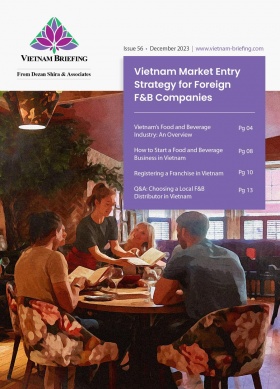Vietnam Defines E-Money for the First Time, Excludes Virtual Currencies from its Scope
Decree 52 provides a clear definition for electronic money (e-money) in Vietnam as “the equivalent value in VND stored electronically,” based on pre-paid funds provided to banks or payment service organizations offering electronic wallet services. According to the decree, e-money can be stored through electronic wallets (e-wallets) and prepaid cards. The State Bank of Vietnam (SBV) has excluded virtual currencies from the scope of this decree as they are not regulated by the country’s financial authorities. Decree 52 takes effect July 1, 2024.
On May 15, 2024, the Vietnamese government promulgated Decree 52/2024/ND-CP (hereinafter, the “Decree 52”) regulating non-cash payments, effective July 1, 2024.
The new decree will replace Decree 101/2012/ND-CP on non-cash payments, and Decree 80/2016/ND-CP on amendments to the Government’s Decree 101/2012/ND-CP on non-cash payments.
Decree 52 will also cause the expiration of Article 3 of Decree 16/2019/ND-CP on amending, supplementing, and abrogating certain articles of Decree 101/2012/ND-CP on non-cash payments.
How Vietnam defines e-money in Decree 52: Key provisions
The new decree defines e-money as the value of Vietnamese Dong (VND) stored digitally, based on the amount of money prepaid by customers to banks, foreign bank branches, and payment intermediary service providers that offer electronic wallet (e-wallet) services.
The Vietnamese government considers e-wallet services as those provided by banks, foreign bank branches, and payment intermediary service providers to their customers, facilitating money deposits, withdrawals, and payment transactions.
Vietnam has over 40 e-wallet providers alongside e-payment services from commercial banks, with around 36 million active e-wallets reported by FiinGroup as of April 2024. The country has not officially allowed nor expressly banned digital currencies and virtual assets.
Article 6 of Decree 52 stipulates that e-money can be stored through e-wallets and prepaid cards.
According to the new decree, banks and foreign bank branches can issue and provide e-wallets and prepaid cards. The provision, issuance, and usage of e-wallets and prepaid cards must comply with the regulations of the State Bank of Vietnam (SBV).
Payment intermediary service providers offering e-wallet services must ensure that the total balance in all bank accounts supporting payments for their e-wallets is not less than the total balance of all e-wallets issued to customers. These providers may only offer services to e-wallets linked to customers’ payment accounts or debit cards.
Transition regulations allow payment intermediary service providers, licensed to provide e-money transfer support services under Clause 5, Article 3 of Circular 39/2014/TT-NHNN, to continue their services as per existing agreements before Decree 52 takes effect.
The SBV emphasized that Decree 52, by providing a clear definition of e-money in Vietnam for the first time, will play a crucial role in preventing and eliminating illegal payment methods issued by unauthorized organizations, as well as supporting competent agencies in combating related legal violations.
Article 34, Law 14/2022/QH15 on Anti-Money Laundering, regulates wire transfer or electronic funds transfer:
- Reporting entities shall be obligated to report transactions involving the transfer of e-money to the SBV if the value of each of these transactions exceeds the value limit determined under regulations signed by the Governor.
- When a reporting entity participates in a transaction involving the transfer of e-money, it shall:
– Adopt risk management policies and procedures to carry out, reject, temporarily suspend a transaction, or conduct post-transaction control; and
– Check whether a transaction involving the transfer of e-money contains required information that is inaccurate or incomplete, and report such transaction as a suspicious activity.
Additional regulations on international payments in Decree 52
Decree 52 has introduced regulatory provisions to clarify:
- The concept of international payments and international payment systems;
- The SBV’s management role in international payments;
- Regulation of service provision activities from abroad to Vietnam and from Vietnam to abroad, including the implementation of international financial switch services;
- Regulation on the approval process for commercial banks and foreign bank branches to participate in international payment systems, and the conditions for approval; and
- Regulation on the responsibilities of related parties in providing complete and timely information and meeting the requirements of state management agencies under Vietnamese law to manage cross-border transaction flows.
The SBV explains that these regulations will strengthen the management role of relevant state agencies in international payment activities. Additionally, the regulations encourage collaborations in delivering cross-border payment services amidst rapid technological developments and innovations that support e-commerce.
Amendments and supplements on payment account regulations
Decree 52 amends and supplements several aspects of the regulations on payment accounts to better align with current practices. These include:
- Regulations on opening and using payment accounts;
- Authorization to use payment accounts;
- Blocking payment accounts and handling them after the blockade ends; and
- Cases of payment account closure and handling the balance upon closing.
Additionally, Decree 52 introduces regulations on providing payment services without using customers’ payment accounts for businesses offering public services. It also amends and supplements regulations related to payment intermediary services.
Making payments in Vietnam: Cashless transactions see jump in volume
Comparing the first four months of 2024 to the same period in 2023, non-cash payment indicators show significant increases. Non-cash payment transactions grew by 51.11 percent in volume and 39.49 percent in value. Transactions via internet channels increased by 47.48 percent in volume and 30.20 percent in value, while mobile device transactions grew by 59.26 percent in volume and 35.91 percent in value.
Conversely, ATM transactions continued to decline, with a 14.15 percent decrease in volume and a 7.84 percent decrease in value, indicating a clear shift from cash to non-cash payments in Vietnam.
The SBV’s Payment Department notes that cashless payment indicators have rapidly accelerated. From 2021 to 2023, the average volume of payment transactions in Vietnam through the Internet and mobile devices grew by 52 percent and 103.3 percent, respectively. During the same period, the volume and value of payments made via QR codes increased by over 170 percent.
By the end of 2023, Vietnam had over 182 million personal payment accounts, with about 87.08 percent of adults owning payment accounts. Additionally, 40 banks reported the official implementation of nearly 35 million active eKYC payment accounts. Electronic Know Your Customer (eKYC) is an automated process that assists companies in digitally verifying customer identities.
Takeaway
The SBV emphasizes that Decree 52 is a crucial legal document for non-cash payments in Vietnam and expects the decree would have a significant impact on related matters. The decree contributes to establishing a robust cashless payment legal framework, aiding the digital transformation of the banking sector. It aligns with Vietnam’s international commitments and aims to enhance safe, modern payments through the adoption of information technologies. Decree 52, along with the Law on Credit Institutions 2024, will take effect on July 1, 2024.
About Us
Vietnam Briefing is published by Asia Briefing, a subsidiary of Dezan Shira & Associates. We produce material for foreign investors throughout Asia, including ASEAN, China, and India. For editorial matters, contact us here and for a complimentary subscription to our products, please click here. For assistance with investments into Vietnam, please contact us at vietnam@dezshira.com or visit us at www.dezshira.com.
Dezan Shira & Associates assists foreign investors throughout Asia from offices across the world, including in Hanoi, Ho Chi Minh City, and Da Nang. We also maintain offices or have alliance partners assisting foreign investors in China, Hong Kong SAR, Dubai (UAE), Indonesia, Singapore, Philippines, Malaysia, Thailand, Bangladesh, Italy, Germany, the United States, and Australia.
- Previous Article Complying with Vietnam’s Personal Data Protection Decree: New Publication
- Next Article The Laboratory Market in Vietnam: Current Trends and Future Prospects































